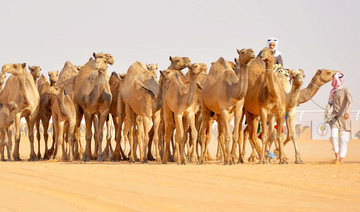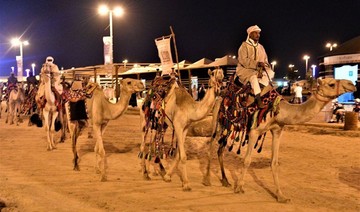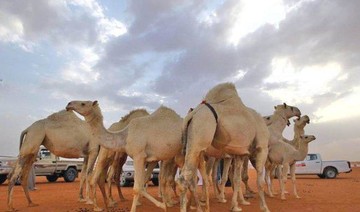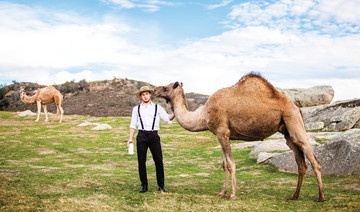TAIF/LONDON: The first warm-ups of the inaugural Crown Prince Camel Festival started in Taif in the early hours of Saturday, with thousands of camels on a two-kilometer, high-tech track. But that was just a start: Under the patronage of Crown Prince Mohammed bin Salman, more than 10,000 camels will be thrown in the ring over the next 42 days in the hopes of winning millions in prize money for special breed, good looks and speed.
Business leaders, politicians and camel enthusiasts from the Gulf states and other Arab countries will head to one of the Middle East’s largest displays of the finest camels in Saudi Arabia and the world. It is considered the strongest of its kind in the region in terms of size and value of the prizes, with SR45 million ($12 million) on offer.
It is also the largest camel race in terms of the number of rounds, with a total of 781, including 308 first warm-up rounds, 20 production runs, two camel marathon rounds, 278 second warm-up rounds and 173 rounds in the final. This puts the festival firmly on top of the annual fixtures that celebrate Saudi culture, sport and the value of its age-old animal, the camel.
In Saudi Arabia today, camels are celebrated for their beauty, grace and speed. Even as the country rapidly modernizes, the animals remain a central part of Saudi culture, and a lucrative one, with camel prices reaching hundreds of thousands of dollars and even breaking the $1 million mark.
The festival aims to enhance the camel heritage in Saudi, Arab and Islamic culture. With that in mind, it will feature sport, cultural and entertainment activities alongside educational workshops for camel owners and visitors interested in camel sports.
“Camel racing is a culture we have inherited from our ancestors,” Hussein bin Saud, a camel owner, told Arab News. “We used to participate in small regional competitions, sometimes without financial prizes, just for tribal and regional reputation. However, over the years, these competitions became popular in the Gulf countries and the competition became more enthusiastic. Countries started to organize and support these competitions with financial prizes.”
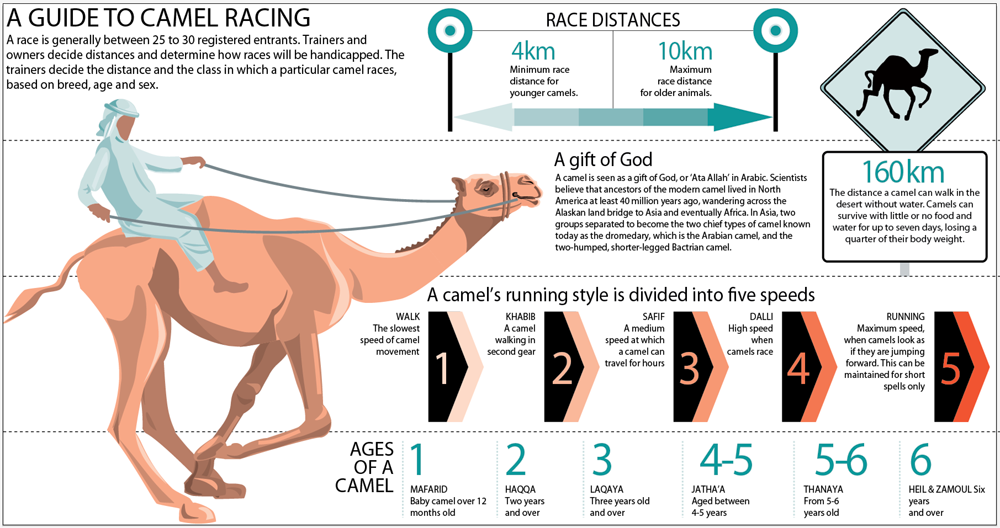
Saturday’s warm-up rounds started amid great interest on the part of owners and organizers. Robots were mounted on the backs of camels and controlled remotely by owners, who followed their camels on a route determined by the organizing committee. The electric-powered robot, which weighs about three kilograms and costs about SR2,000, can work for several hours.
The race categories are classify camels according to their age, sex and distance they can travel: Mafarid, Haqqa, Laqaya, Jatha’a, Thanaya, Heil, Zamoul and Soudaniyat.
Races start with the entrance of the camels to the yard, where the robots are mounted on their backs. Next, camels are moved to the numbering and registration site and then transferred to another location, where they are brought to the starting platform by the organizers.
Musa Abdullah, one of the workers on the starting platform, explained that camels are arranged in rows without any escorts. Then the starting gate is lifted remotely and the race begins.
The organizing committee of the festival prepared a 10-kilometer camel race track, consisting of seven paved tracks, three dedicated to camel owners and one for media, with an outside barrier preventing individuals from entering the field.
CLICK HERE TO VIEW OUR PHOTO GALLERY
The manager of the camel field in Taif, Nawaf al-Qurashi, said that the old site was developed in a short period of time. The field was completely illuminated by the latest types of lighting and divided according to the types of camels involved.
“This festival offers an opportunity for all lovers of camel racing to participate,” said Mohammed Al-Marri, an owner from the Eastern Province.
“The equipment that we have seen since our arrival in Taif gives a strong indication that this festival will be the largest in the Middle East.”
And then there is the benefit to the region’s economy. On the side of the camel field, there were a lot of fodder sellers, especially farmers who grow alfalfa, as well as sheep sellers, restaurateurs and other vendors.
Mirghani Ahmed, an alfalfa seller, was reaping the gains. “The influx of camels to this region has increased the demand for fodder, so we harvest the crop of farms and bring it to the camel field to sell it,” he said. “We may bring two or three loads sometimes because of the high demand.”
Mashhud Aman, who works in a nearby restaurant, is another to benefit. “Camel racing has revived the market with the influx of camel owners and the workers accompanying them,” he said.
The festival will continue for eight days before stopping during the Hajj, and then continue until Sept. 21. The key races will take place on weekends and include two sets of warm-up rounds.





